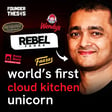
The investor who built a 250 Cr skincare brand | Romita Mazumdar @ Foxtale
"Every skin has its own story."
Romita Mazumdar's profound statement encapsulates the core philosophy of Foxtale, a skincare brand built not just on efficacy, but on deeply understanding the individual narratives behind every customer's skincare journey. It's a rejection of a one-size-fits-all approach, embracing the diversity of needs and experiences.
Romita Mazumdar is the Founder & CEO of Foxtale, a rapidly growing D2C skincare brand in India. From leaving a career in venture capital, Romita built Foxtale which in a short span of time has achieved a revenue run rate of ₹250 crore. She's a powerful example of an "investor turned entrepreneur," demonstrating that deep market understanding and user empathy can be powerful drivers of startup success.
Key Insights from the Conversation:
- Efficacy-First Approach: Foxtale prioritizes solving specific skin problems with clinically-backed formulations, rather than chasing ingredient trends.
- Data-Driven Optimization: A combination of consumer insights and data is used to deliver a 6%+ website conversion rate.
- Hybrid Growth Model: Foxtale balances its strong online presence (50% website revenue, with 40% organic) with strategic marketplace and offline expansion.
- Building an Institution: Romita emphasizes the importance of creating sustainable processes and a strong organizational culture, not just short-term startup growth.
- Power User Advantage: Building a brand in a category which you are a power user of, creates a significant headstart.
Chapters:
[00:00] Intro: Investor Turned Entrepreneur
[09:55] The Growth Equity Opportunity in India
[19:59] VC vs Growth vs PE: Valuations & Bets
[28:42] The "Thousand Crore, 20% EBITDA" Vision
[39:23] India Wants Efficacy & Quick Results
[48:37] Designing the First Four Hero Products
[58:39] Foxtale: Every Skin Has Its Own Story
[1:08:17] The Single Founder Bet & The Power of Honesty
[1:18:20] The Secret to Foxtale's 6% Conversion Rate
[1:28:10] Hiring Philosophy: Bias Against Pedigree
Hashtags:
#Foxtale #RomitaMazumdar #SkincareIndia #D2C #Entrepreneurship #StartupIndia #VentureCapital #GrowthHacking #BrandBuilding #ConsumerInsights #DataAnalytics #Efficacy #SkinCareRoutine #IndianStartups #FounderJourney #BusinessStrategy #MarketingStrategy #FemaleFounder #BeautyTech #PersonalCare #Podcast #FounderThesis #IndianPodcast



















